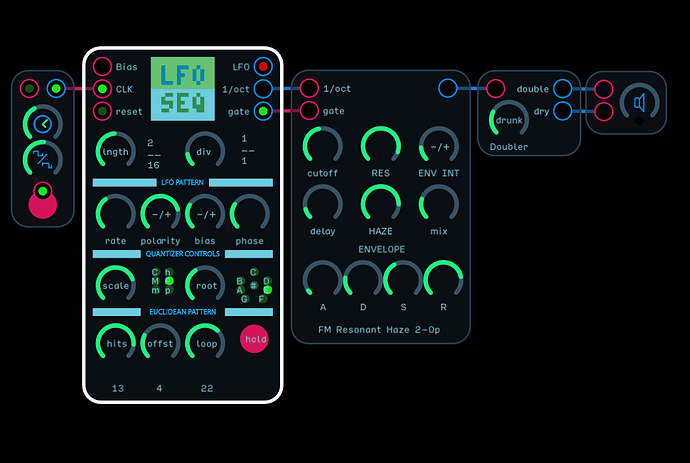Has anyone attempted to build a doubler, such as the Mimiq pedal?
I think it could be built in Audulus. I’m thinking something like the following:
- split input left and right, right being “dry”, left being “wet”.
- use a delay on the wet signal with mix at 100% so only the delayed signal is heard, set to a single repeat. Have the time/ms parameter modified randomly in a very small range to try to mimic the slight timing changes a human would naturally have.
- the same as #2 but with very small pitch changes
- the same as #2 but with very small volume changes
The above would be for “live” playing. But for studio tracking, the same could be done with an additional 100% mix delay without the randomness on the “dry” signal, with the milliseconds set to the median of the range used to alter the “wet” signal. That would allow the notes from the “wet” to sometimes be heard BEFORE the “dry” and not just after.
thoughts?
2 Likes
Welcome to the Audulus forum! Glad to have you aboard.
If you smoothly modulate the delay, you will introduce pitch changes as the delay time changes. The amount of pitch change will be proportional to the rate at which you modulate the delay. Pitch will rise when you shorten the delay time and fall when the delay time is increased. Also you will introduce some perceived volume changes as a result of varying phase cancellation between the dry and delayed signal. It might not be necessary to carry out steps 2 and 3. Delaying the dry signal so that the wet signal could precede the dry as well as follow it would also be possible as you suggest, although it might introduce some sync problems with other tracks unless you compensate for the additional latency.
1 Like
stschoen, thanks for your response. Good points about volume and pitch being natural by-products of a shifting delay time. Why would there be phasing issues at all? With wet and dry signals being panned hard to each side, I don’t see how phase cancellation would come into the picture.
1 Like
Even with a stereo pair there will be phase cancellation effects. Put one of your speakers 180 out of phase and you will notice a significant decrease in the low end. Obviously not as noticeable as the same situation when the signals are mixed down to mono, but since each ear receives a mix of sound from both sides there will be cancellation. Even with headphones the effect is somewhat noticeable.
2 Likes
So, does this phase cancellation also occur when double-tracking is done in the traditional way, by recording two tracks separately? If so, I guess there’s no way to avoid or rectify it?
It just seems odd that the point of all of this is to make an instrument sound thicker or “meatier”.
1 Like
I don’t see how one could avoid it. Don’t forget that while some portions of the signal will be attenuated, others will be boosted. It may well be that the constantly changing phase and the resulting changes in frequency response are a key part of the effect. You could potentially enhance the phase cancellation by mixing a small amount of each signal into the other although that might not be necessary. As the phase of each side varies with respect to the other a small addition of the other signal would certainly introduce changes in both amplitude and overall spectral content. Without cross-mixing the phase cancellation (and boost) would be subtle in most cases and would depend on your position in the stereo field but it might be sufficient to introduce the desired effect. From the video it would seem the the pedal is modulating the amplitude in some fashion but it isn’t clear what approach they’re actually using.
1 Like
This sounds like a job for an ALL PASS FILTER!
Here’s something I whipped up, it sounds more like a standard modulated chorus delay for the most part, but it’s pretty fun nonetheless.
drunken doubler.audulus (339.9 KB)
3 Likes
